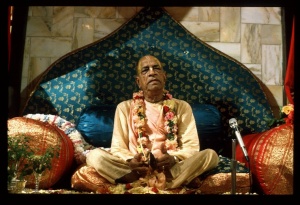CC Antya 20.132: Difference between revisions
No edit summary |
(Vanibot #0054 edit - transform synonyms into clickable links, which search similar occurrences) |
||
| Line 17: | Line 17: | ||
<div class="synonyms"> | <div class="synonyms"> | ||
''kṛṣṇera'' | ''[//vanipedia.org/wiki/Special:VaniSearch?s=kṛṣṇera&tab=syno_o&ds=1 kṛṣṇera]'' — of Lord Kṛṣṇa; ''[//vanipedia.org/wiki/Special:VaniSearch?s=śabda&tab=syno_o&ds=1 śabda]-[//vanipedia.org/wiki/Special:VaniSearch?s=guṇe&tab=syno_o&ds=1 guṇe]'' — by the qualities of the sound; ''[//vanipedia.org/wiki/Special:VaniSearch?s=prabhura&tab=syno_o&ds=1 prabhura]'' — of Śrī Caitanya Mahāprabhu; ''[//vanipedia.org/wiki/Special:VaniSearch?s=mana&tab=syno_o&ds=1 mana]'' — the mind; ''[//vanipedia.org/wiki/Special:VaniSearch?s=ākarṣilā&tab=syno_o&ds=1 ākarṣilā]'' — was attracted; ''[//vanipedia.org/wiki/Special:VaniSearch?s=kā&tab=syno_o&ds=1 kā] [//vanipedia.org/wiki/Special:VaniSearch?s=stry&tab=syno_o&ds=1 stry] [//vanipedia.org/wiki/Special:VaniSearch?s=aṅga&tab=syno_o&ds=1 aṅga] [//vanipedia.org/wiki/Special:VaniSearch?s=te&tab=syno_o&ds=1 te] [//vanipedia.org/wiki/Special:VaniSearch?s=ślokera&tab=syno_o&ds=1 ślokera]'' — of the verse beginning with the words kā stry aṅga te; ''[//vanipedia.org/wiki/Special:VaniSearch?s=artha&tab=syno_o&ds=1 artha]'' — the meaning; ''[//vanipedia.org/wiki/Special:VaniSearch?s=āveśe&tab=syno_o&ds=1 āveśe]'' — in ecstasy; ''[//vanipedia.org/wiki/Special:VaniSearch?s=karilā&tab=syno_o&ds=1 karilā]'' — described. | ||
</div> | </div> | ||
Latest revision as of 20:18, 19 February 2024

His Divine Grace
A.C. Bhaktivedanta Swami Prabhupada
A.C. Bhaktivedanta Swami Prabhupada
TEXT 132
- kṛṣṇera śabda-guṇe prabhura mana ākarṣilā
- “kā stry aṅga te” ślokera artha āveśe karilā
SYNONYMS
kṛṣṇera — of Lord Kṛṣṇa; śabda-guṇe — by the qualities of the sound; prabhura — of Śrī Caitanya Mahāprabhu; mana — the mind; ākarṣilā — was attracted; kā stry aṅga te ślokera — of the verse beginning with the words kā stry aṅga te; artha — the meaning; āveśe — in ecstasy; karilā — described.
TRANSLATION
That chapter also tells how the attributes of Kṛṣṇa’s sound attracted the mind of Śrī Caitanya Mahāprabhu, who then described in ecstasy the meaning of the "kā stry aṅga te" verse.